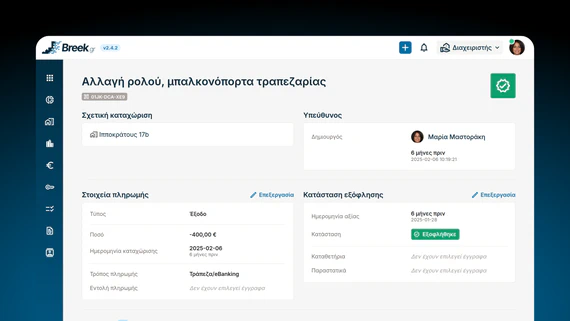
Updated Custom subscription package, and price harmonization
Updated Custom package, without the limitation of 50 total properties Recent new members of Breek.gr with a total number …

If I were to ask you to think about the connection between shark attacks and property management, you would probably not see much of a connection, if any. And yet, there is an intriguing parallel between these seemingly unrelated subjects that can offer valuable insights into managing a portfolio of real estate properties, whether these are being rented out on a long-term or on a short-term basis.
How does the seeming randomness of shark attacks (admittedly, unheard of in Greece) relate to property management? How can this analogy help you understand and prepare for the inherent unpredictability a property manager’s workload? And how can a digital approach to property managing make it easier to handle these “shark attacks”?
Cult movies like “Jaws” and “Sharknado” have ingrained in the public consciousness the idea that shark attacks are highly impactful events.However, the perplexing (in-)frequency at which shark attacks occur is far more interesting than their admittedly deadly impact: shark attacks are famous (well, perhaps outside of Greece) for their rarity, which sometimes unexpectedly gives way to a sudden occurence of multiple shark attacks within a very short time.
In other words, weeks or months may pass without incident until, one week, it seems as if there’s an epidemic of shark attacks. The media then revels in the opportunity to generate alarmist headlines. For weeks, nobody had been thinking about sharks or their attacks. Suddenly, shark attacks are “Breaking News”. Speculation runs rampant: what could be causing these “living fossils” to attack surfers and other beach-goers en masse? Is it climate change? Are the sharks suddenly bored? Angry? Hungry? All of the above?
No. The pattern of shark attacks happening either very infrequently or suddenly in clusters can be explained using probability theory.
Now, I know your eyes might glaze over at the mention of math, but let me explain.
Even though we now know that sharks are indeed social animals, and even though some species might temporarily hunt in pairs or in packs , for the most part, sharks are solitary , typically living and hunting by themselves. From this, and since sharks do not hunt humans for sustenance or fun (at least not outside of trash-pop movies), we can assume that shark attacks on humans occur independently of each other. This means that one attack does not increase or decrease the likelihood of another attack happening soon after.
Bear with me for a minute, in which you’ll have to take my word (actually, mathematicians’ word), and simply accept the following statistical fact: when events (such as shark attacks) are independent of each other, their “interarrival times” are “exponentially distributed”.
More precisely: in probability theory, if events occur independently and at a constant average rate, the time between consecutive events (called the interarrival time) follows an exponential distribution. The exponential distribution is characterized by its “memoryless” property, which means the probability of an event occurring in the future is independent of how much time has already elapsed.
Lots of math jargon, but what does this mean?
Take a stopwatch (or a calendar). When a shark attack happens, start your stopwatch and count the time until the next shark attack inevitably happens. Write down the time (more likely, the number of weeks) elapsed and reset your stopwatch.
Repeat this for a long enough time to gather data (and since shark attacks are rare, this might take you years). The time periods you recorded are the “interarrival times”: records of the time between the “arrival” of the “events”. Inter-arrival.
Now sort the list of times you wrote down and put them into, for example, 10 “buckets” that span time periods between the minimum and the maximum values you counted. For example, if you counted a minimum of 0 weeks (i.e. some shark attacks happened within the same week) and a maximum of 10 weeks, your “buckets” will be 0, 1, 2, .., 9 weeks.
Now count how many of the time periods that you recorded fall within each “bucket”. You should see that the buckets with smaller values (0, 1, 2, etc.) contain more records than the buckets with larger values (e.g., 7, 8, 9 weeks). In other words, more shark attacks happen closer together than farther apart from each other.
This means that while long periods may pass without any attacks, there can also be short bursts where multiple attacks happen in quick succession. This distribution is characterized by having many short interarrival times and a few long ones, creating periods of inactivity followed by flurries of activity.
How does this relate to Property Management? If you have any experience in work that requires coordination and responsiveness to events arising from numerous sources (such as properties, or their tenants, or their owners) you might already be seeing where I’m going with this…
Each property in your portfolio can be seen as a generator of events, much like each shark in the ocean can generate an event that we call an “attack”. Most of these events are generally independent; a burst pipe in one property does not affect whether a heating issue will occur in another; a tenant delaying rent payment does not affect his neighbor’s diligence in paying his own rent. Others are related but outside of the property manager’s influence, such as a power outage in the municipality or intense rainfall in the region causing insurance claims across multiple properties.
Therefore, just as sharks generate events that we call “attacks”, real estate properties generate “events” that require a property manager’s attention. Such events include:
Every single “shark” in your property portfolio reliably generates many of those “attacks” while it’s under your ownership or management. Each of those events requires your attention, experience and intelligence, communication, coordination and delegation skills. It also requires diligent record-keeping, documentation, and verification.
If you think about it, getting attacked by a shark, though life-threatening, is way rarer than the irregular stream of “shark attacks” from a single property under your management.
Now multiply this with the number of properties in your portfolio! As the size of your property portfolio grows, the total number of these events also increases. And since most of these events are independent for a single property and independent between properties, you find yourself in the now-familiar world of “shark attack clusters”.
Most of the time in Property Management, events happen sporadically. However, occasionally, they cluster together, leading to very intense and busy periods, in which you simply don’t have enough time to get everything (or anything) done. This means you might experience weeks where everything is running smoothly, followed by days where it seems like everything and everyone requires your attention at once and without delay. There are weeks when days roll by, and days in which entire weeks of work need to take place.
Given that the above situation happens with “statistical certainty”, what can a property manager or a property management team do to deal with the inherent reality of their work more effectively and with less hassle? Here are five ideas:
Reduce unpredictability of events: Though you will never have a crystal ball to warn you about unexpected and unforeseeable “shark attacks” by the properties under your management, you can make some of them “less unexpected”. For example, you can use Breek.gr’s Attachments feature to record the expiration date of any attachment so the system can remind you well in advance that something will soon require your attention. You can attach warranty documents to equipments and furniture listed in a property’s inventory and set their expiration date to receive a notification in advance. And, you can benefit from the quick overview of expiring tenancies within different time horizons on Breek.gr’s Dashboard view.
Slash the time to information: Based on our team’s research with property managers and real estate experts across Greece, tons of time is lost daily on searching information in files (and often not finding them) on hard drives, network drives, USB sticks, email attachments and looking for documents in dusty binders full of crusty paper that smells like an old bookstore. By comparison, with Breek.gr, scattered, incomplete, and outdated information is a thing of the past, as you can capture, enrich, search, and update your property information with ease, all from a single place, with the comfort of your laptop or tablet.
Slash the time to a resolution: How can you deal with more events within a single day, if you can’t stem the flood of incoming clusters of events of a large and growing property portfolio? Simple and obvious: make each event require less time on your side. Easy to say, difficult to achieve without digitalization… Another insight from our team’s market research is that next to the challenge of finding information on a property in a timely manner (or at all!), lots of time is also spent coordinating via email, passing that information along as an attachment that ends up in the “black hole” of your email account. Lots of time is also wasted on playing “phone ping-pong” to keep owners (and sometimes tenants) informed about the status and progress of a task, or to remind a tenant of an overdue payment, etc. With Breek.gr you can keep everyone informed without extra effort by inviting them to play a role in the lifecycle of a property, its tenancies and tasks.
Preemptively manage the “base load”: The times between “shark attack clusters” can be deceptively quiet. In fact, they are full of opportunities to review the property portfolio’s needs and tackle upcoming and unsurprising tasks long before they becoming urgent right in the middle of an unexpected “shark attack cluster”. To make these periods productive, you need an overview that is lacking in traditional property management with “pen and paper” or with tens of Excel sheets. With Breek.gr’s snappy user interface, list views and filter and search functionality, you can rapidly slice and dice the data of your property portfolio and find pending and overlooked needs before the next wave of “shark attacks” lands.
Stay on top of things: As the number of things (properties, tasks, payments, documents, tenancies, …) you manage of increases, so does the probability of losing track of where some of those things might be stuck. Few things are as annoying and embarrassing as smacking your forehead in realization that you forgot to check on that task, verify that payment, respond to that tenant’s complaint, check on the financials of a property to provide a report to its owners, all while you had been juggling tens more tasks like these–even though you came to work this morning fully certain that you will get around to finishing all of those pending tasks. With Breek.gr, everything is interconnected. You can jump from a property group (a building or complex) to one of its properties. From that property you can jump to its tasks. From one of its tasks you can jump to related financial transactions. Everything is interconnected and one or two clicks away, so that you can stay on top of things without having to interrupt your train of thought to look through your phone or email or file folders to find a small nugget of information.
The work of a property manager is dynamic, requiring an organizational personality, attention to detail, versatility, responsiveness, and discipline. While no tool is a “miracle cure” for the challenges of the role, utilizing the rich feature set of Breek.gr means that those who manage large and growing property portfolios in Greece can breath a bit easier, knowing that they don’t need to run their “mental engine” at 9000 rpm all the time to deal with the inevitable “shark attack clusters” inherent to property management. Breek.gr serves as your digital sidekick in reducing surprises, slashing time and effort, becoming efficient and effective, and staying on top of things, even when others falter under the stress of the demanding and fulfilling new role as a professional property manager.
The analogy between shark attacks and property management events may seem unconventional at first, but it highlights the unpredictable nature of managing rental real estate properties. By recognizing that events can cluster unexpectedly, and using the digital features of Breek.gr, you can better prepare for and manage the demands of the portfolio you manage and/or own, ensuring smoother operations and less stress.
So next time you watch “Jaws” or “Sharknado” and think about shark attacks, remember that they have more in common with property management than you once imagined. And that Breek.gr is here to help you master the challenges of your role even if many properties under your management are about to unexpectedly launch an inevitable “event cluster”.

Updated Custom package, without the limitation of 50 total properties Recent new members of Breek.gr with a total number …

Following the recent upgrade of Breek.gr to version 2.3 and as another improvement of the web application based on …
With your new user account on Breek.gr you can create and manage five properties for free, one of which with the full functionality of the Monitor tier. Test-drive Breek.gr now and experience first-hand how it makes property management a breeze!